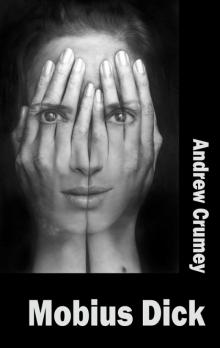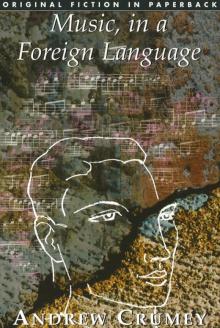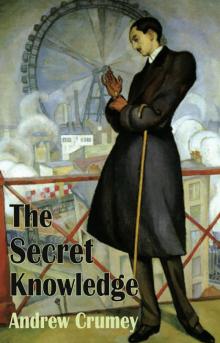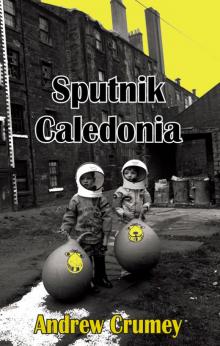- Home
- Andrew Crumey
Music, in a Foreign Language Page 2
Music, in a Foreign Language Read online
Page 2
1
It sounded no different from pushing an old, empty car down over a hill in order to get rid of it; the speed at which it had approached the bend, and the efforts of the driver to save himself – if he had had time to make any – did nothing to alter the impression that it was only useless junk which was crashing heavily in the darkness through low bushes. And the hillside was being littered with the contents of a suitcase – socks, underwear, trousers – and the contents of a briefcase also, or perhaps a file or folder – papers were being scattered. All of this, they would have to go over carefully afterwards. They would gather every document they could find, for subsequent inspection. Then they would take out the sheaf of typed notes they had been given and throw them, a handful at a time, into the air so that in the darkness the breeze would catch them and they would fall naturally amongst the trail of clothing, metal parts and other rubbish. And then they would have gone back up to the roadside – how many of them were there? Difficult to tell – two or three might be enough. Perhaps one of them would have remembered to check that the driver had not survived, or would not survive. Perhaps they would have done him that final service. Then back to the roadside – all quiet. The road brushed clean of the fine black gravel at the bend; the roadsign corrected – a row of chevrons, white on black, pointing to the left; the metal board inverted and screwed back in place – the chevrons pointing to the right. And on the road itself, a black rubber solution easily removed with industrial solvent – the word SLOW revealed in white paint.
Had you been there to see it, you might have been disappointed by the ordinariness – indeed, the banality of the scene. The white Morris Commonwealth hitting the barrier, the heavy crunching. All quite undramatic – not at all like the films. Not in slow motion, but still ponderous and heavy, and not a good way to die. And all his things coming out of the door when it flew open, when it was pulled back on itself and crumpled under the body of the car then reappeared as the car turned again, the door flapping like an injury and the suitcase opening on impact. The briefcase opening on impact. The things, all those things left behind. The socks, the underwear, those trousers. The typewritten papers. The briefcase opening on impact. Or perhaps a file or a folder.
And when Duncan wasn’t looking out of the window of the train he was reading a story by Alfredo Galli about a young man who sees a girl sitting in a bus and immediately falls in love with her. The bus is just pulling away from the stop as the man walks past. He sees the girl sitting near the back – she looks up and he feels he must speak to her. He tries to get on the bus before it picks up speed but the doors are already closing and the bus goes away with the beautiful girl looking round over her shoulder. So he remembers the number of the bus and every day for a month he rides this route as often as he can – his job as a cafe waiter permitting – but he never sees her. Then one night who should walk into the cafe where he works but the girl – alone – and she goes and sits in a corner and brings out a little book – like a diary – and she starts writing in it. And he is on his way to take her order when another waiter called Luigi – whom he hates – beats him to it and fetches her a vermouth and chats to her a little before he goes to serve another customer. And although he is desperate to catch her eye she only writes in the little notebook or occasionally stares out into space and he thinks she looks somehow sad ‘like a nightingale which has lost its song.’
The train had reached the next station and Duncan became aware of people getting on – his solitude was threatened. Faces drifted past the window, peering inside, looking for spaces, and figures were moving down the aisle. Don’t think now about the crash.
a nightingale which has lost its song. He went through his shift that night like an automaton; aware only of the girl in the corner of the cafe.
Someone had put a bag onto the seat opposite. Duncan glanced up and saw a girl with black hair – foreign looking. Now she was putting things up onto the luggage rack. She looked down at him – asked if the seat was free. Italian accent. He gave a nod, then she sat down and began to arrange some things on the table. A paper bag moist with sandwiches; a book.
The girl wrote with an air of concentrated absence, like a machine at work – though the steady movement of the pen resembled more some blind process of nature, which the young man watching found at once compelling and irritating – for the girl seemed wholly oblivious to everything around her; wholly uninterested.
Duncan heard a voice: ‘I see you are reading Alfredo Galli.’
And across the pages of her book, the pen flicked like a mayfly.
Reading on a train is not like reading in the comfort of your home, where you can relax, stretch your legs, be alone. Be undisturbed, and break off only when you decide you want to. When you read on a train there are always other competing demands for your attention; stations appear and fill for a moment the little world of the window beside you, people come and steal parts of your space. They talk to you. And then other stories intrude on the one you are trying so hard to follow. The story you read on the train is a different one from when you are at home; it is a story full of interruptions, punctuations, digressions.
The Italian girl had been in Britain for a week. And now she was telling him why she didn’t like London.
‘At the Underground station – at King’s Cross – I got robbed. The very first day I arrived here! Can you believe it? I was getting onto the train and there were some people pushing behind me to get on, and other ones were trying to get off, and I was in the middle like a little squashed beetle – I thought oh no, help – and then when I got on and the train started I realized after a while that my purse was gone! Not much in it, thank God – a few pounds only. But now I have learned to be more careful.’
The story you read on a train is a fragile, delicate thing; and though you look after it as best you can, still it can so easily become lost in the forest of other stories which you must journey through. She’s not going to let you read, Duncan. Don’t fight it. Her name is Giovanna.
Giovanna is brought up in Cremona, and spends her childhood longing for escape. She goes to Milan and is a student there, and many young men fall in love with her, and she falls in love with many men, but the ones who want her never coincide with the ones whom she wants, and she sometimes feels destined to grow into a lonely old woman dressed in black who sits at her balcony looking down on a world filled with regrets and unfulfilled longing. Or else she might compromise her high ideals and marry Fabio, who is sweet but tediously unrelenting in his efforts to please her. Fabio moves to Zurich, and every year for the rest of his life sends her a card on her name day.
She soon tires of university and quits her course, then finds work in a picture library, where she is hired because the boss wants to sleep with her, but he never succeeds, and she does her job well, finding appropriate photographic images to satisfy the requirements of the publishers, advertising agencies and other clients. For holiday brochures, there are photographs of Paris, Istanbul, Vienna and all the other great cities of the world. There is the Taj Mahal in full sunlight, or in the cool of the evening, or even a delayed exposure night shot with a full moon superimposed above. Travel pictures are Giovanna’s speciality. But then there are also the portraits of anonymous models, the photographs of every type of car, every type of salad. Photographs of new born babies, of corpses, of machinery. Giovanna grows tired of her job, and not only because of the occasional lecherous remark from her boss. In the room full of travel photographs, filed, labelled and cross-indexed like dead butterflies, she senses a world outside that is revolving without her.
But she told Duncan none of this, and when she got up to go to the toilet he was glad to return to his book.
The girl remained in the cafe for some time. She had another vermouth – which Luigi also brought. The young man watched the strange girl with growing fascination. He tried to compare her with his memory of when he had first seen her, sitting on the bus weeks before. He paid little attention
to his own work – customers got the wrong change, or the wrong order. For more than an hour she sat in the corner, making her drink last. When she didn’t write she would stare sadly at a point somewhere in space. Then, while Luigi was busy with a customer, she quickly got up and walked out.
‘Hey!’ The young man ran after her. The fact that she had not paid her bill was more convenient than necessary. She had gone out into the street – he followed. She ran, and he did too. The little book fell from her hand or her purse, and as he picked it up from the gutter and reverently wiped the dirt from the cover, the girl escaped from his sight and was gone.
2
Approaching the bend. Night. If you had been there you might have heard the dull pop of the gun. Not a shot ‘ringing’ out, like it always says in the books, but a sound like a small firework, or even a car tyre bursting; an unexciting sound, and the white car hitting the barrier, rolling and turning. Crashing down the hill-side.
Duncan looked up and saw that Giovanna had come back, and he watched the curve of her hip as she slid behind the table and sat down again opposite him. Her hair seemed fuller now and freshly combed. She saw that he wanted to read, so she picked up her own book and the thick paperback fell open like a sliced fruit at the page she had marked.
At work in Milan, Giovanna makes a date with Franco, who runs errands and is three years younger than she. In her flat, she lies on the couch as Franco’s inexperienced hands work clumsily on the buttons of her blouse, and she watches the silent flickering television screen. Then there is a news flash, tanks are moving in and out of searchlight beams and the red arcs of tracer bullets are finding windows, walls and people. She reaches for the remote control and Franco is annoyed, but too young and shy to complain, and she turns up the volume so as not to hear him. The announcer counts the people he has seen killed before him during the previous twenty minutes, when a peaceful demonstration turned into a riot. She sends Franco home, then cries for the people who have lost their lives, and for the life which she is wasting.
The ticket collector was coming down the carriage.
‘Right. There you are love. Thank you sir.’ The scrutiny of the ticket collector. ‘Ah. You’ve got a blue saver here.’
‘Yes,’ said Duncan, ‘it’s a blue day today, isn’t it?’
‘No, white savers or standard fare today sir. I’m afraid you’ll have to pay the difference.’ The ticket collector consulted the yellowed pages of his fare manual. ‘That’s another two pounds please.’
Duncan looked in his wallet and found a one pound note and another four shillings in change. ‘I’m afraid I haven’t got enough on me. I was sure Sunday was a blue day.’
‘Not in Summer, sir.’
‘But it’s only April.’
‘Well, Summer starts early here you know. If you haven’t got it then I can take your details and you can send the money later. If you could just show me your identity card, I’ll take your name and address.’
Giovanna interrupted: ‘Duncan, please, how much do you need?’
‘Oh, no, it’s alright.’
‘Please. What do you need? I have two pounds, look. Take it, please.’
‘Well, how about if you lend me six bob and I can pay you back?’
When Duncan reached London on Friday he was carrying nine pounds and seven shillings. His fares, food and other expenses must have come to three pounds and three shillings. He had given five pounds to tip the man at the Office of Public Records. He would know to take more next time.
‘It’s very kind of you.’ Duncan offered to send her the money, but she only laughed and told him to think nothing of it. And Duncan consoled himself with the thought that since she was a foreigner she could easily afford it.
For six months Giovanna does nothing. She continues to work at the picture library, has a few more dates with Franco, but tires of his company. Every day the television brings news of a world situation changing too rapidly for anyone to comprehend. Old ideologies are replaced by new ones, former enemies become allies. There is the changing of names – names of political parties, of government bodies, of countries. All of this happens on the television, and Giovanna’s life seems trivial and insubstantial by comparison. There are the demonstrations in the streets; the faces of the protestors – students, workers, artists. She is exhilarated by the prospect of revolution. She longs to go and be part of it all. But for more than a year Giovanna still does nothing.
Now they were both reading their books. Duncan eased his stiff legs back out into the space from which they had retreated, until he met the obstacle of her feet.
‘Pardon.’
‘Sorry.’
Reading on the train is not like reading in the park, when it’s sunny and you can sit on a bench and stretch your legs and forget all your worries. Or on the grass; you can lie down and relax (after you checked for dog shit of course). You can lie on your side with the sunshine so bright on the page you have to screw up your eyes (it’s always shiny bleached paper on the imports, not like the cardboard rubbish) – but that’s not so good. It gets uncomfortable. Or on your back, with the book like a sunshade, and this is fine until your arms get stiff. Then you stop for a while and watch the girls go by in those tops they’re all wearing now, and maybe one of them will look at you.
The girl’s diary was dirty from where it had landed in the gutter. He wiped the cover, then waited in the street unsure of what to do. The girl had gone, so he went back to the cafe. Luigi was laughing. ‘When you chase a customer for the price of two vermouths then you are certainly in love! But don’t waste your time. I’ve already made a date with her.’
Better to shut your eyes now Duncan, and pretend to be asleep.
The car approaching the bend. Your father’s white Morris Commonwealth approaching the bend, and then some obstacle, hastily erected – a fallen tree, perhaps, or another car, sitting in the road in the dark, and your father’s inattention; his preoccupation, and the attempt to stop in time – the white Morris Commonwealth hitting the barrier.
Duncan felt the muscles relaxing in his legs; he felt his knees gently falling from the position he had held them in. He saw the flicker of sunlight through his closed eyelids. And he felt the side of his knee reach a part of Giovanna’s leg. Only the vaguest of sensations; probably only her loose jeans that he was touching, so that she hadn’t noticed. But he left his leg there.
(In the park, you see a pretty girl walk by. You call out from where you are lying on the grass and ask her the time, and she calls back and walks on, and you feel rather foolish because your own wristwatch is plainly visible. Though it might have stopped, of course. In any case, what’s the harm in being obvious? Sometimes they like that.)
With the rocking of the train, Duncan’s leg was bumping softly against hers, though she wasn’t moving away.
And if you could have been there, Duncan – if you could have been able to see it. Nearly twenty years ago – you were only a young child. Your father’s white Morris Commonwealth hitting the barrier …
The rocking of his knee against the unmoving obstacle. Duncan could feel the material of his jeans giving with the slight pressure against her leg; a pattern of changing sensations as the material crumpled and moved, from which to infer the nature of her limb – its shape, texture and other qualities. From this point of contact, he could try to reconstruct the rest of her body.
Reading in the park is not as good as reading at home, where nothing can distract you. Why did you need to read in the park anyway, when by simply going there you had already found the escape you wanted? But reading in the park is not for escape; it’s more an excuse, since you don’t like sitting there with nothing else to occupy you – except watching the girls in those tops they’re all wearing now. But back in the flat, then it was a good time to do some serious reading, when Charles and Joanna still hadn’t come home to interrupt you, and you could make a cup of coffee and sit on the floor with your back against the sofa. Because reading is so g
ood for you, and there are all those books you want to get through if only you can find the time. Maybe if you ration out the hours somehow; set yourself a programme, so much per day.
Duncan’s knee had been held in the same position against her leg for so long now that it was becoming quite stiff and numb, and the pattern of textures from which he had been trying to derive so much information was now becoming submerged by the messages from other muscles, begging him to move. He gave a sleepy sigh and rearranged his leg, his eyes still closed, though getting a little sore now – and red patterns like oriental carpets swirling on his closed eyelids. He opened his eyes for a moment, and saw that she was concentrating on her book. When he closed them again he let his legs relax once more into a new position, until again his knee found its goal.
But even when you were reading at home, you were still thinking about the pretty girl in the park, and how she looked round then walked on, and it was as if she didn’t have a care in the world – because sunshine has that strange way of making everyone seem happier than perhaps they really are. And then, before you could get much further, Charles got back from the university and you ended up in that stupid argument.
Duncan opened his eyes, and when he glanced under the table he saw that his knee had actually been resting against the table leg. The conversation was resumed. She had been staying in Cambridge.
‘Such a lovely town,’ she said. ‘All those beautiful old buildings.’
‘Mostly reconstructed after the war.’ Duncan told her he was born there, but his mother took him away to live in York when he was four, following the death of his father. ‘It was a car crash.’

 Mobius Dick
Mobius Dick Music, in a Foreign Language
Music, in a Foreign Language The Secret Knowledge
The Secret Knowledge Sputnik Caledonia
Sputnik Caledonia